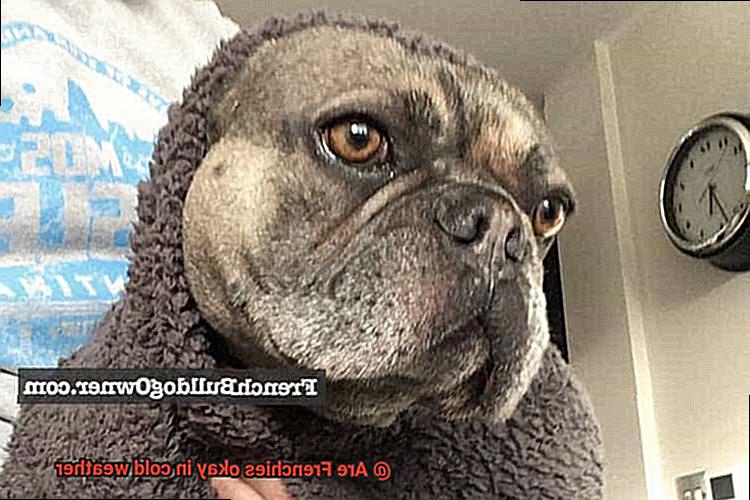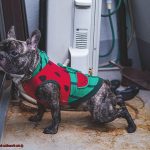Are Frenchies okay in cold weather?
Ever wondered if your adorable Frenchie can handle the chilly winter months? Well, wonder no more.
Today, we’re diving into the fascinating world of French Bulldogs and their ability to brave the cold. These little bundles of joy have stolen hearts left and right, but with their short coats and small size, it’s natural to wonder if they can handle low temperatures.
So grab a hot cuppa joe, snuggle up, and join us as we explore whether Frenchies are okay in cold weather. We’ll delve into their unique physical characteristics and share some important tips for keeping them safe and comfy.
Get ready to uncover the secrets behind your Frenchie’s winter adventures.
Are Frenchies okay in cold weather
Contents
- 1 Are Frenchies okay in cold weather
- 2 Understanding the French Bulldog’s Physiology
- 3 Preparing Your Frenchie for Cold Weather
- 4 Investing in Warm Attire for Your Frenchie
- 5 Limiting Outdoor Exposure During Extremely Cold Weather
- 6 Creating a Cozy Environment Indoors
- 7 Ensuring Proper Hydration for Your Frenchie
- 8 Recognizing Signs of Discomfort or Distress in Your Frenchie
- 9 Tips to Keep Frenchies Comfortable in Cold Weather
- 10 Conclusion
French Bulldogs, also known as Frenchies, are adorable and affectionate pets. But when the temperature drops, many Frenchie owners wonder if their furry friends can handle the cold. As an expert in this field, I’m here to share valuable insights and tips to ensure your Frenchie stays warm and comfortable during chilly winter months.
Understanding the Risks:
French Bulldogs have a short coat and minimal body fat, making them more vulnerable to the cold than breeds with thicker fur. Their brachycephalic faces also pose challenges in regulating body temperature efficiently. It’s important to be aware of these factors and take necessary precautions to keep your Frenchie safe.
Temperature Check:
While French Bulldogs can handle temperatures above freezing for short periods, extreme cold can be dangerous for them. Below freezing temperatures put them at risk of hypothermia and frostbite. Keep an eye on the weather forecast and take extra precautions when temperatures drop.
Duration of Exposure:
Prolonged exposure to cold weather, even if the temperature is within a reasonable range, can still be harmful to Frenchies. Limit their time outdoors during frigid conditions and provide a cozy indoor environment to keep them warm.
Preventive Measures:
Here are some practical tips to ensure your Frenchie’s comfort during cold weather:
- Dress Them Up: Invest in high-quality dog sweaters or coats designed for French Bulldogs. These will provide an extra layer of warmth and protection against the cold.
- Protect Their Paws: Cold surfaces like snow and ice can be painful for your Frenchie’s sensitive paws. Consider using paw protection wax or dog boots to shield them from the cold ground and potential hazards.
- Create a Warm Indoor Environment: Provide a comfortable bed with extra blankets or a heated pad for your Frenchie to snuggle into. Avoid drafts and keep the temperature inside your home at a cozy level.
- Hydration is Key: Even in cold weather, it’s important to ensure your Frenchie stays hydrated. Use heated bowls or add warm water to their drinking water to encourage them to drink.
- Watch for Signs of Discomfort: Keep an eye out for shivering, lethargy, or excessive whining, as these may indicate that your Frenchie is too cold. If you notice any of these signs, bring them indoors and warm them up gradually.
Understanding the French Bulldog’s Physiology
French Bulldogs, or as we affectionately call them, Frenchies, are unique little creatures with distinct physiological characteristics that can influence their tolerance to cold weather. Just like us, they have their own quirks when it comes to staying warm and cozy in chilly climates.
So, let’s dive right into understanding their physiology and learn how we can help our furry friends stay toasty during the winter months.
Short Coat Blues
Frenchies have a short coat, which means they don’t have the same natural insulation against the cold as their long-haired counterparts. They don’t have a built-in fur coat like a polar bear, so it’s up to us to provide them with some extra warmth.
Consider investing in a stylish doggy sweater or jacket that will not only keep them cozy but also make them the talk of the town.
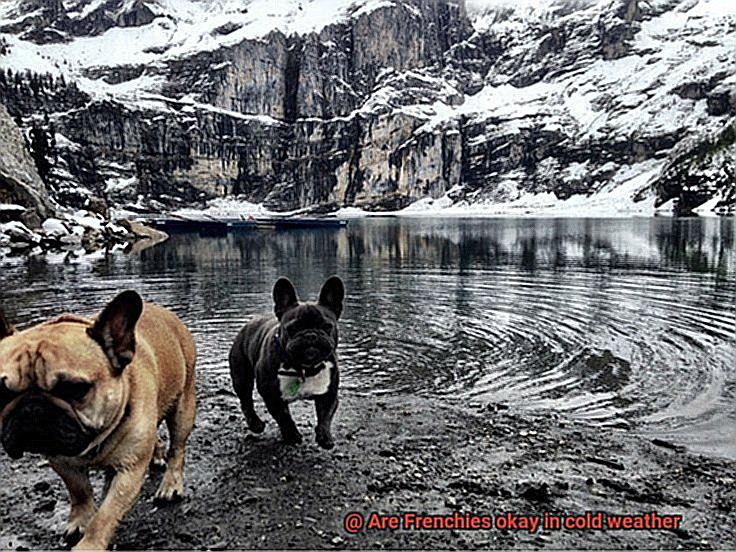
Breathing Woes
One of the unique features of French Bulldogs is their brachycephalic facial structure. What does that mean? Well, it’s just a fancy way of saying they have short noses. While this gives them an adorable and distinctive appearance, it can also lead to respiratory issues in extreme weather conditions.
When exposed to cold temperatures, their airways may constrict, making it harder for them to breathe. Keep an eye on their breathing patterns and if you notice any signs of discomfort, it’s time to head indoors and snuggle up by the fireplace.
Fat Matters
Now, we’re not saying French Bulldogs need to hit the gym, but they do have a relatively low body fat percentage compared to other breeds. Fat acts as insulation and helps regulate body temperature. With less fat to keep them warm, Frenchies may feel the cold more intensely than other dogs.
So, let’s spoil them a little and provide them with some extra padding in the form of soft blankets or heated beds. They deserve it, after all.
Size Matters Too
French Bulldogs may be small and compact, but don’t let their size fool you. Their petite stature means they have a higher surface area-to-volume ratio. What does that mean? Well, in simple terms, it means they lose body heat more quickly in colder temperatures. So, keep an eye on their little paws and ears during winter walks. If they start to feel cold, it’s time to head back inside and warm them up with some hot cocoa (or doggy-friendly hot broth).
Preparing Your Frenchie for Cold Weather
When the temperature drops, it’s important to take extra care of your beloved French Bulldog. Here are some tips and tricks to keep your Frenchie warm and comfortable during cold weather.
- Bundle them up: French Bulldogs have short coats and lack body fat, making them more susceptible to the cold. Invest in some stylish sweaters or jackets to keep them cozy during outdoor activities. Not only will they look adorable, but they’ll also be protected from the chilly air.
- Limit outdoor time: While your Frenchie may enjoy playing outside, it’s important to limit their time in cold weather. Take them out for short bathroom breaks and exercise sessions, but bring them back indoors once they start showing signs of discomfort or shivering.
- Keep them warm indoors: Make sure your home is comfortably heated for your Frenchie. Provide them with cozy bedding or blankets in their sleeping areas to help them stay warm and snuggly during colder months.
- Protect their paws: Cold pavement and icy surfaces can be tough on your Frenchie’s sensitive paws. Consider using paw balm or dog booties to provide an extra layer of protection. This will not only keep their paws warm but also prevent discomfort or even frostbite.
- Stay hydrated: It’s easy to forget about hydration during the winter, but dogs still need access to fresh water even when it’s cold outside. Ensure that your Frenchie has clean water available at all times to prevent dehydration.
- Regular grooming: Keeping up with grooming is essential during the winter months. Regular brushing helps stimulate blood circulation and distribute natural oils, improving overall coat condition and providing some added insulation for your Frenchie.
Remember, taking proactive steps to prepare your Frenchie for cold weather is crucial for their comfort and well-being. By following these tips and tricks, you can ensure that your furry friend stays safe and cozy all winter long.
Investing in Warm Attire for Your Frenchie
French Bulldogs, with their short and thin coats, are more susceptible to the cold weather compared to other breeds. To keep your Frenchie comfortable and protected during the colder months, it is important to invest in warm attire.
Not only does it provide them with an extra layer of insulation, but it also adds a stylish touch to their overall appearance. In this article, we will explore the key items to consider when investing in warm attire for your Frenchie.
- Sweaters: Sweaters are a must-have for your Frenchie’s wardrobe. They are ideal for providing additional warmth to their body, especially during walks or outdoor playtime. Look for sweaters made from soft and breathable materials that are easy to clean.
- Coats: If you live in an area with harsh winters or extremely cold weather, a coat is a great investment. Coats cover a larger portion of your Frenchie’s body and provide added insulation. Opt for coats that are both stylish and functional, ensuring they allow for ease of movement.
- Booties: Protect your Frenchie’s paws from the cold ground, ice, and salt with booties. These not only keep their paws warm but also prevent potential injuries from sharp objects or rough terrain. Make sure to choose booties that are comfortable and have good traction.
- Hats: Don’t forget about your Frenchie’s head and ears. Hats can provide extra warmth while adding a stylish touch to their ensemble. Look for hats that are designed specifically for dogs and made from soft materials that won’t cause irritation.
When purchasing warm attire for your Frenchie, it is important to consider their size, comfort, and ease of movement. Avoid clothing that restricts their natural movements or causes discomfort. Properly measure your Frenchie before buying any warm attire to ensure the perfect fit. Most retailers provide size charts and guidelines to assist with this process.
Keep in mind that not all Frenchies will enjoy wearing clothes. It may take time and patience to get your Frenchie accustomed to wearing warm attire. Gradually introduce them to it and reward them with treats or praise for positive behavior.
Regularly check the condition of your Frenchie’s warm attire, especially after outdoor activities. Repair or replace any damaged items to ensure continued protection and comfort.
Limiting Outdoor Exposure During Extremely Cold Weather
As much as we love our French Bulldogs, it’s important to remember that they are not built for extremely cold weather. With their short, thin coat and sensitive nature, they are more susceptible to the dangers of freezing temperatures compared to other dog breeds.
In order to keep your Frenchie safe and comfortable during chilly winter days, it is crucial to limit their outdoor exposure. Here are some tips to help you protect your furry friend:
- Dress them up: Just like we bundle up in warm clothes during cold weather, French Bulldogs need extra layers too. Invest in a cozy sweater or jacket that covers their entire body, and don’t forget booties to protect their sensitive paws from the cold ground.
- Pay attention to behavior: While outside, keep a close eye on your Frenchie’s behavior. If you notice them shivering or lifting their paws off the ground, it’s a clear sign that they are too cold and should be brought indoors immediately.
- Provide a warm shelter: If your French Bulldog needs to spend time outdoors, make sure they have a warm and comfortable shelter. This can be a well-insulated doghouse or a heated outdoor space with blankets or straw for added warmth.
- Keep activities short and supervised: Avoid taking your Frenchie for long walks or engaging in rigorous outdoor activities during extremely cold weather. Short and supervised bathroom breaks are sufficient to prevent prolonged exposure to the cold.
- Create an indoor exercise routine: If you live in an area with harsh winters, it’s a good idea to create an indoor exercise routine for your Frenchie. This can include playing fetch in a spacious room or using interactive toys that provide mental stimulation.
Remember, always monitor your French Bulldog for any signs of discomfort or distress during cold weather. If you notice any unusual behavior or physical symptoms, consult with a veterinarian immediately. By taking these precautions and limiting their outdoor exposure, you can ensure that your beloved Frenchie stays safe and warm during the coldest months of the year.
Creating a Cozy Environment Indoors
Winter is here, and while the chilly weather may be delightful for some, it can pose a challenge for our beloved French Bulldogs. These adorable pups are known for their sensitivity to extreme temperatures, including the cold.
As responsible pet owners, it’s crucial that we create a cozy environment indoors to keep our Frenchies warm and comfortable during these frosty months. Follow these tips to ensure your furry friend stays snug as a bug in a rug.
Snug as a Bug in a Frenchie Bed
Invest in a high-quality dog bed that provides insulation and warmth. Look for materials like fleece or memory foam that retain heat and offer a cozy surface for your Frenchie to rest on. Trust me, they’ll love it.
Blankets and Heat Pads – Warmth Galore.
Add an extra layer of warmth to your Frenchie’s bed with blankets or heating pads. Opt for lightweight and breathable materials to prevent overheating. It’s like wrapping them up in a warm hug.
Regulate the Temperature – Keep Jack Frost at Bay
Keep the indoor temperature regulated to keep your Frenchie comfortable. Say goodbye to drafts and cold spots by using a space heater or adjusting the thermostat. Your Frenchie will thank you.
No More Winter Wonderpaws – Limit Outdoor Exposure
Minimize your Frenchie’s time outdoors during freezing weather, especially for extended periods. Quick bathroom breaks are necessary, but make sure they’re properly dressed with a dog sweater or jacket. Fashion meets function.
Playtime Purrfection – Keeping Active Indoors
Engage in interactive activities that keep your Frenchie physically and mentally stimulated while staying cozy indoors. From playing fetch to using puzzle toys, keep those tails wagging and hearts warm.
Quench Their Thirst – Hydration Matters
Even though it’s colder, ensure your French Bulldog has access to fresh water at all times. Avoid metal bowls outdoors, as they can become ice cold and freeze the water. Nobody likes a brain freeze.
Ensuring Proper Hydration for Your Frenchie
Cold weather can be harsh on our French Bulldogs, and it’s important to remember that proper hydration is crucial for their overall health and well-being. Here are some tips to ensure your Frenchie stays hydrated even in colder months.
Provide Fresh Water
Regardless of the temperature outside, fresh and clean water should be available to your Frenchie at all times. Dogs can become dehydrated in cold weather due to the dry air and increased energy expenditure to keep warm. Ensure that their water bowl is always filled and replenished regularly.
Check and Refill the Water Bowl
Dogs may drink less when it’s cold outside, so it’s important to check the water bowl regularly and refill it if needed. This will prevent your Frenchie from becoming dehydrated without you realizing it.
Consider Using a Heated Water Bowl
In colder climates, freezing water can be a concern. Consider using a heated water bowl or placing the water bowl in a warmer area of the house to prevent the water from freezing. This will ensure that your Frenchie always has access to water.
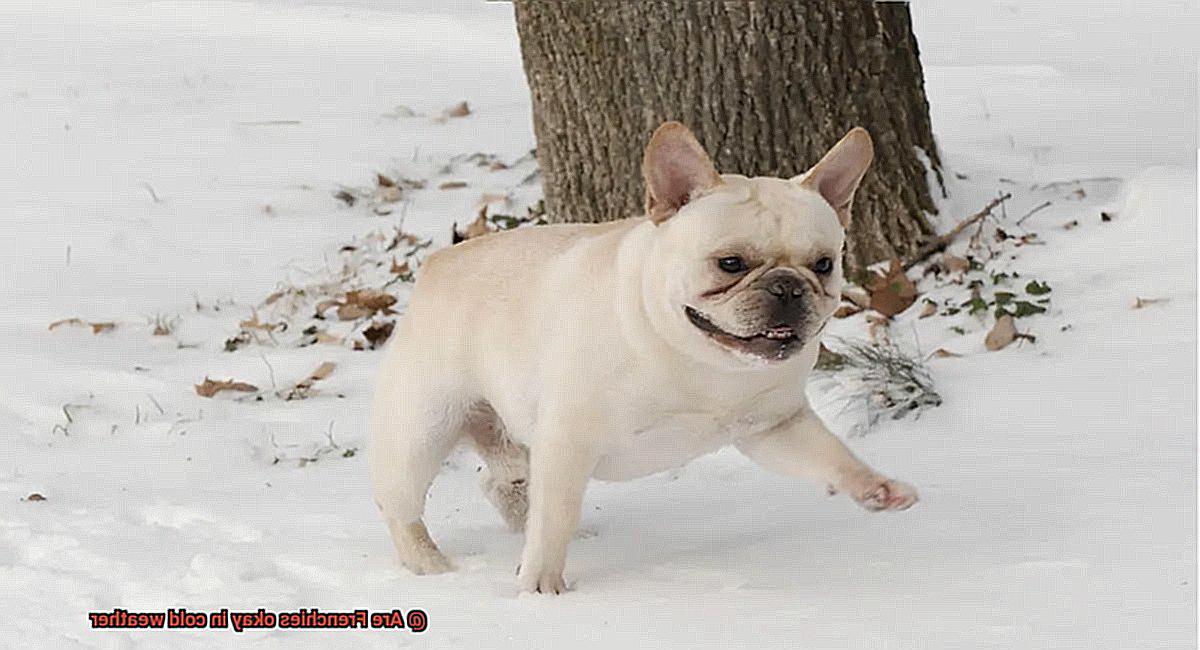
Offer Warmer Water
Some Frenchies may prefer warmer water during cold weather. You can try adding a small amount of warm water to their bowl to make it more enticing for them to drink. Just make sure the water is not too hot, as this can be harmful.
Hydrate Through Wet Food or Homemade Broth
If your Frenchie is not drinking enough water, you can offer hydration through wet food or homemade broth that is safe for dogs. This can help increase their fluid intake and keep them hydrated.
Avoid Cold Water and Ice Cubes
While Frenchies may enjoy playing with ice cubes during hotter months, it’s best to avoid giving them very cold water or ice cubes in winter. This can shock their system and cause discomfort.
Watch for Signs of Dehydration
Pay attention to signs of dehydration in your Frenchie, such as excessive panting, dry nose and gums, lethargy, and loss of skin elasticity. If you suspect your Frenchie is dehydrated, consult with a veterinarian for proper guidance and treatment.
Recognizing Signs of Discomfort or Distress in Your Frenchie
Brrr. It’s cold outside, and our furry friends, the French Bulldogs, may need some extra attention during this chilly season. As an expert in all things Frenchie, I’m here to help you recognize the signs of discomfort or distress in your beloved pooch during cold weather. With a little knowledge and some proactive measures, we can keep our Frenchies cozy and comfortable all winter long.
Shivering – The Chilly Shake:
Just like us, French Bulldogs shiver when they’re cold. If you notice your Frenchie shaking or trembling, it’s a clear indication that they need some warmth. Consider snuggling up with them under a cozy blanket, or even investing in a doggy sweater to keep them toasty.
Paw Licking – Frozen Feet:
Excessive licking or biting of paws is a sign that your Frenchie’s little tootsies are feeling the chill. Protect their paws from freezing temperatures by providing them with booties or keeping them indoors during extreme cold weather. They’ll thank you for it.
Body Language – The Cold Hunch:
Pay attention to your Frenchie’s body language. If they’re hunching their back, tucking their tail between their legs, or seeking shelter, it means they’re trying to protect themselves from the cold. Create a warm and cozy space for them indoors where they can snuggle up and feel safe.
Change in Behavior – Winter Blues:
Cold weather can affect our Frenchies’ behavior too. If you notice that your Frenchie becomes more lethargic, refuses to go outside, or seems unusually anxious, it may be a sign that they’re not coping well with the cold temperatures. Provide them with extra comfort and warmth during these times.
Frostbite Alert – Protect Those Extremities:
French Bulldogs are susceptible to frostbite, especially in their ears, paws, and tail. Keep a close eye on these areas for any signs of discoloration, swelling, or blisters. If you notice anything unusual, seek immediate veterinary attention.
Pre-existing Health Conditions – Extra Care Needed:
Certain health conditions can make French Bulldogs more vulnerable to discomfort in cold weather. If your Frenchie has arthritis or respiratory issues, take extra precautions and consult your veterinarian for specific advice on how to keep them comfortable during colder temperatures.
Conclusion:
By being aware of the signs of discomfort or distress in your Frenchie during cold weather, you can ensure their well-being and keep them warm and cozy all winter long. Remember to pay attention to their behavior, body language, and overall health, and take proactive measures to protect them from the cold. With a little extra care, our Frenchies can thrive even in the chilliest of seasons.
Tips to Keep Frenchies Comfortable in Cold Weather
French Bulldogs are adorable and loving companions, but they need extra care to stay comfortable in cold weather. Their short coats and flat faces make them more susceptible to the chilly temperatures. As an expert on this topic, I will provide you with essential tips to keep your Frenchie cozy and safe during the winter months.
Dress them up in style:
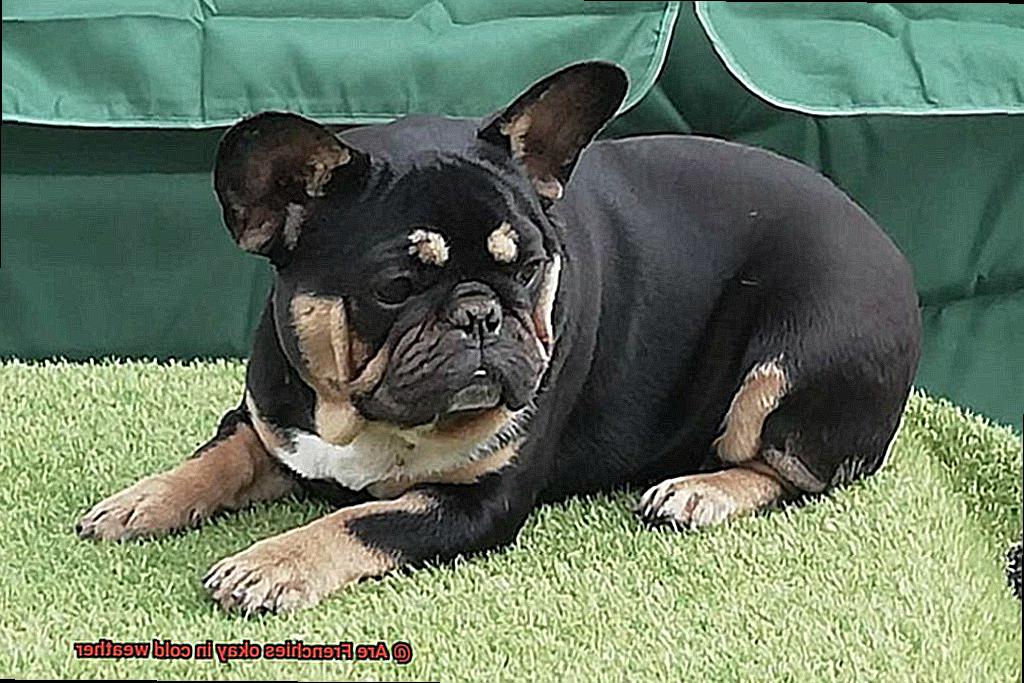
Invest in a doggie sweater or coat that fits snugly to keep your Frenchie warm. Look for ones specifically designed for small breeds like French Bulldogs. These fashionable outfits will not only make your furry friend look adorable but also provide the necessary insulation against the cold.
Protect their paws:
Cold surfaces and chemicals used to melt ice can harm your Frenchie’s sensitive paws. Use dog boots or apply paw wax to create a protective barrier. This way, your Frenchie can still enjoy outdoor adventures without discomfort or injury.
Create a cozy indoor retreat:
Ensure your Frenchie has a warm and comfortable sleeping area indoors. Use blankets, dog beds, or even a heated pet mat to provide them with a cozy spot to snuggle up. Avoid placing their sleeping area near drafts or cold surfaces.
Limit outdoor exposure:
While Frenchies love outdoor playtime, it’s important to limit their time outside during extremely cold weather. Short walks for bathroom breaks and exercise are enough to keep them active without risking their health. Always bring them back inside where it’s warm and cozy.
Stay hydrated:
Just because it’s cold doesn’t mean your Frenchie doesn’t need water. Make sure they have access to fresh water at all times. Consider using heated bowls or slightly warming the water to encourage them to drink.
Watch for signs of discomfort:
Pay attention to your Frenchie’s behavior when exposed to the cold. Shivering, whining, or reluctance to go outside are signs that they may be feeling too chilly. Take immediate action by bringing them indoors and providing extra warmth.
Em5WE9QFfa0″ >
Conclusion
French Bulldogs may not be the best companions for chilly climates. Their short coats and compact bodies make them more susceptible to the cold. While they can handle moderate cold temperatures, extreme weather conditions can pose a serious risk to their health.
It’s important to take precautions when exposing Frenchies to cold weather. Dressing them in warm and protective clothing, such as dog sweaters or jackets, can help insulate their bodies and keep them cozy. Additionally, limiting their time outdoors during frigid temperatures is crucial to prevent frostbite or hypothermia.
Don’t be fooled by their adorable appearance – French Bulldogs are not built for harsh winter conditions. Their short snouts make it difficult for them to regulate their body temperature efficiently, putting them at a higher risk of overheating in warmer weather and freezing in colder climates.
If you live in an area with severe winters, it’s essential to provide your Frenchie with a warm and comfortable indoor environment. This could include using space heaters or heated dog beds to ensure they stay snug during those frosty nights.
Remember, your Frenchie’s well-being should always come first. It’s better to err on the side of caution and prioritize their safety by keeping them indoors during extreme cold spells. By taking these necessary precautions, you can ensure that your beloved Frenchie remains happy and healthy throughout the year.
In conclusion, while French Bulldogs may tolerate moderate cold temperatures, they are not well-suited for harsh winter weather. With their short coats and limited ability to regulate body temperature effectively, it’s important to protect them from extreme cold conditions.
